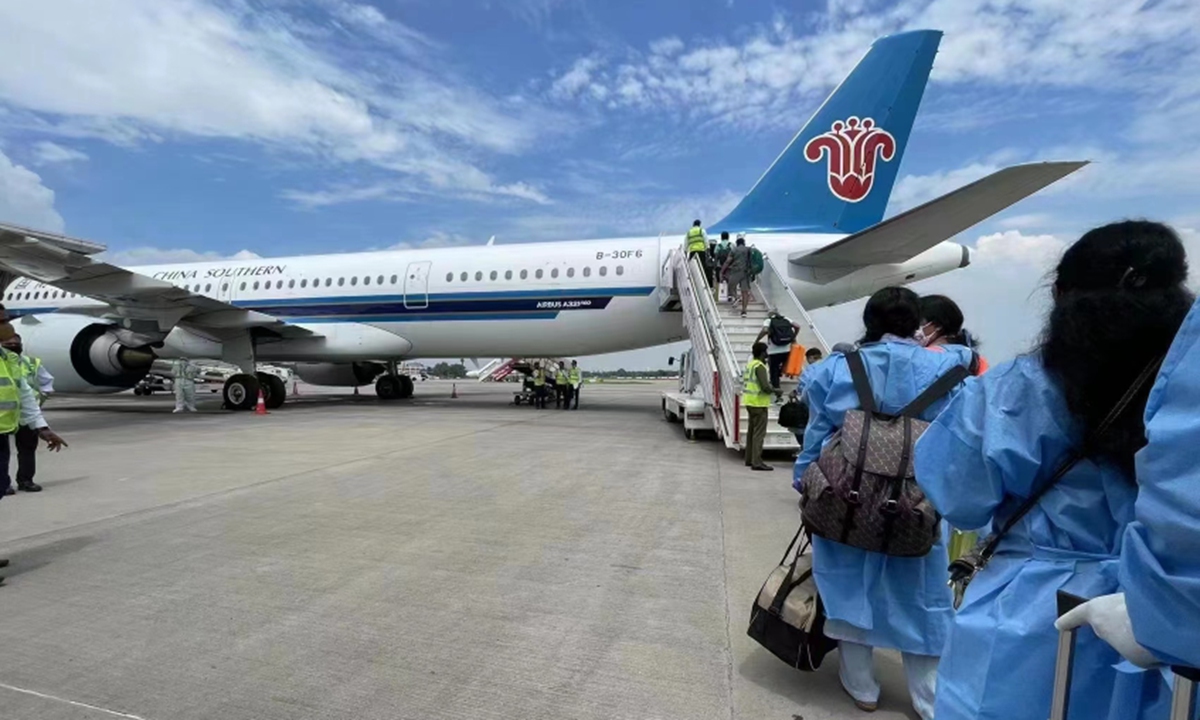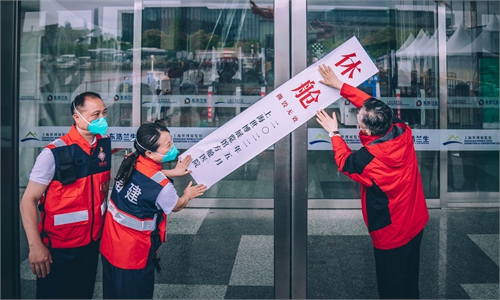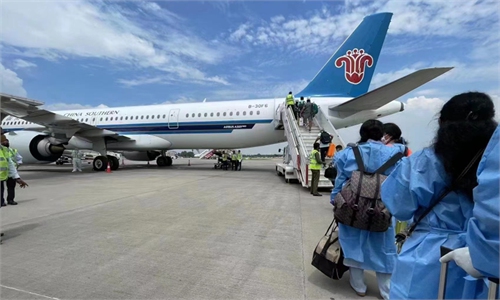Foreign business groups welcome China's simplified cross-border travel arrangement
Government pledges to facilitate entry, exit of businesspeople as virus is under control

A charter flight carrying 107 Indian businessmen arrived in Hangzhou, East China's Zhejiang Province, on August 9,2022. Photo:Courtesy of China Southern Airlines
Foreign business representatives and industry groups welcomed a simplified cross-border travel process for personnel exchanges as the Chinese government has ramped up efforts to make it easier for businesspeople and students to enter China.While there is still time until a full relaxation takes place, due to sporadic cases in some parts of China, the situation has largely eased as epidemic control enters a new phase, which is reflected in the shortened quarantine periods for international travelers, simplified visa applications and more direct flights.
Meanwhile, foreign businesspeople expect business potential to be fully unleashed as travel restrictions are relaxed, the Global Times learned.
The General Administration of Customs announced on Thursday the launch of the 9th edition of the entry and exit health declaration form, in which declaration requirements for nucleic acid test information, previous infection status, and vaccination dates of entry and exit personnel have been cancelled.
This came just a day after the State Council, China's cabinet, held an executive meeting to implement 19 additional policies to stabilize the economy, in which the facilitation of the entry and exit of business personnel was highlighted, a message that has received positive feedback from foreign business representatives.
The British Chamber of Commerce (China) welcomed the announcement and the trend of a gradual relaxation for international business travelers, while awaiting more concrete details.
"There is no doubt that we are seeing more international business travel into and out of China this year compared to the previous two years…the resumption of direct flights as of two weeks ago, the reduction in quarantine time, further relaxation of visa policies and pre-travel documentation requirements that was announced earlier this year have increased the willingness of business personnel in our member companies to travel internationally," the British chamber said.
The Chinese government released newly updated COVID-19 control protocols on June 28, stipulating that close contacts and inbound travelers be under medical observation in isolation at designated sites for seven days plus three days of in-home health monitoring, an obvious reduction compared with 14 days of medical observation and seven days of health monitoring under the previous edition.
The British chamber said that "increased international business travel in and out of China would facilitate greater people-to-people exchanges and information sharing across borders, which would enable international companies to better deliver products and services to their customers, and enhance understanding of the China market."
Juha Tuominen, chairman of Finncham Beijing, welcomed the move to relax international travel, saying that "further relaxing the entry hurdles and shortening the mandatory quarantine time to enter the Chinese mainland will surely be something that Finnish companies welcome."
Easing up on business travel will have a positive impact on foreign companies' investment activities, Tuominen said.
Chinese governments have ramped up measures in supporting foreign companies in China to resume business and production as part of the country's promise for a further opening-up while battling against sporadic outbreaks.
On July 30, a chartered flight carrying 163 businesspeople from Pakistan landed in Hangzhou, Zhejiang Province, before they headed to Yiwu, a commodities hub, to seek new opportunities and partnerships while placing orders. Similar trips were also conducted for businesspeople from countries including India and South Korea, media reported.
Moreover, to facilitate the application processes for foreign businesspeople and students traveling to China, holders of valid APEC business travel cards and foreign students with valid study and residence permits can now enter China with no need to apply for a new visa. The policy took effect from Wednesday.
This policy will enable APEC card holders and students to enter China using their existing visas, which is indeed a huge step forward, Ong Tze Guan, chairman of the Singapore Chamber of Commerce and Industry in China, said on Thursday.
Allowing APEC card holders to enter China without applications for visas will help, but the percentage of people with APEC cards is not that high, Guan said, noting that APEC card holders are mostly those who own businesses in China, and the bulk of the people who need to come to China often have already obtained work visas.
The announcement that China is seeking to ease border entry requirements for APEC business travel card holders is positive for those from APEC countries, the EU Chamber of Commerce in China (EUCCC) told the Global Times.
The China-Britain Business Council (CBBC) told the Global Times on Thursday that business people from Britain want to be able to visit China to see their business partners again and to make progress with their investment plans.
"Steps such as the restoration of direct, scheduled flights between China and the UK and the removal of the PU Letter as a requirement to obtain a visa to come to China have undoubtedly boosted market confidence among British companies with interests in China," CBBC said.
The proposal to further ease travel restrictions will be seen positively and raise the confidence of businesses of China, Guan said.
Chinese market attractiveness to foreign capital remains resilient, with the actual use of foreign capital up by 17.3 percent year-on-year from January to July, the Ministry of Commerce revealed.
The comprehensive advantages of China's complete industrial system, market size and positive economic fundamentals have created a good foundation for the development of foreign-funded enterprises in China, Commerce Ministry spokesperson Shu Jueting said on Thursday.
Moreover, China has formulated policies and measures to stabilize foreign investment, and actively responded to the demands of foreign-funded enterprises to facilitate business operations in China, which enhanced sense of gain for enterprises, Shu said.



